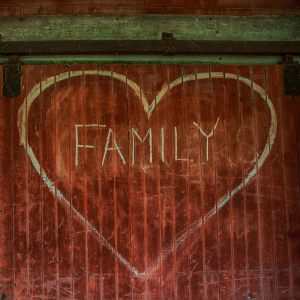In Part 1, I went into some ways you can stop being a whiner. Now, it’s time to explore why that’s important—so you don’t raise whiny children.
Remember this? (No? Did I just date myself?)
Well, it’s unfortunately true in most things. Not necessarily in this straight-forward of a way, but let me explain.
Just as toddlers mimic what we do, they will continue to be exposed to what we value as they grow up. As much as we wish our chatter would be all that’s necessary to guide them, they will mostly learn from seeing and doing rather than by listening. So why do we yak so much at them?
This is a major reason behind my motivation to make a home on rural property. This is not an indictment of how anyone lives their life, but for me, I felt like I can talk about eating locally and seasonally and why that’s important until I’m blue in the face, but my daughter will understand it more intimately if we just did it together. If we got our hands dirty and learned the whole process together. Even if she hates it and even if she chooses differently for her life outside of our family nest, I want her to have that experience and that knowledge, to know that she can always return to the earth because it is there for her. As much as I will be crafting a permaculture food forest and I’m really excited about it, it’s less for me than for her. It’s my love letter to her.
It’s my humble opinion that this cannot be taught on a screen or in a classroom.
I’ve talked before about Peter Gray and his play-based learning and I will do so again. To review, I’m posting my own text from a guest-post I did for The Paleo Parents a while back:
Western cultures—though the rest of the world is catching up—prize efficiency, value, and productivity. Play has nothing to do with any of those concepts. In fact, play may be the exact opposite of those concepts. In our quest for economic dominance, we’ve forgotten that play actually serves a critical function in the development of a human being.
When fox cubs tumble, mock bite, and yelp together, what we’re actually seeing is their initiation into foxhood. Those skills will serve them later when they’re hunting, competing for mates, and raising their young. The same is true for human children, though we could be forgiven for forgetting this, because the ends do not necessarily resemble the means. Humans have complex social, emotional, mental, and physical skills to learn, which is why childhood lasts so much longer for us than for other animals. Play provides a safe atmosphere to test abilities, challenge limits, and learn emotional control. If it gets to be too much, a child can simply “time out.”
And we’ve all heard of so-called free-range parenting. All wonderful concepts, but why aren’t we reinforcing this every day?
 If you were to run a value assessment on your life, it might start with listing the things you value in your life. For many people, the first thing on their list is “family.” And yet, if we use the amount of time we spend in a given activity as a metric, what comes out on top for most Americans? Work/job/career. The argument could be made that without money, you can’t support your family, but then that’s not directly valuing family is it?
If you were to run a value assessment on your life, it might start with listing the things you value in your life. For many people, the first thing on their list is “family.” And yet, if we use the amount of time we spend in a given activity as a metric, what comes out on top for most Americans? Work/job/career. The argument could be made that without money, you can’t support your family, but then that’s not directly valuing family is it?
For the record, I’m not actually advocating that we focus all our free time and energy on our family—quite the opposite! I’m merely pointing out that how we live our lives is the direction we’re paving for our children. If you think that being a parent is the most important role you’ll have in your lifetime, then we should give heavy consideration to what we show them is possible in this life. Chances are, if you’re here, you’ve already done this with their nutrition. Now it’s time to think about the rest of it.
Because I don’t want a child who can’t sing thinking she can go on American Idol if only she dreams big enough. I don’t want a child who wants me to call her college professor to get her a higher grade she hasn’t earned. I don’t want a child who knocks around until she’s 30 without purpose. I don’t want her to compare herself to the false images of women in the media.
I want a resilient child who can fight her own battles, grow plants from seed, and change a flat tire. Who knows her strengths and weaknesses, her limitations and when to push her boundaries. Who knows how to ask for help when she needs it, but only after she’s tried and experimented on her own. I would much rather raise a yoga and surf bum who lives within her means than a lawyer who goes hundreds of thousands of dollars into debt only to work 80+ hour weeks and hate her life. I don’t care what she scores on her SAT.
I had friends who were the best and brightest students in school who freaked the eff out when they were out on their own. And I think it was the crushing weight of what it takes to survive today: laundry, dishes, paying for everything, the worry about money, not having everything they want when they want it. Real life just wasn’t as smooth and easy as answering math questions on worksheets or memorizing history factoids.
I remember reading years ago some comments made by Angelina Jolie about her children. She had adopted two children, Maddox from Cambodia and Zahara from Ethiopia, before having her first biological child, Shiloh. She remarked on the behavioral differences: “Shiloh seemed so privileged from the moment she was born.” Any visit abroad often proves to American parents that something is indeed amiss. Kids in other cultures often exhibit less whining and crying, less attention-seeking behavior, and more initiative and independence. This is completely reckless assumption, but this tells me there may be some epigenetic stuff going on, that we are indeed passing on our entitlement from generation to generation, and why each subsequent one is even more insufferable than the last. I think there are two main reasons, and one of them is that they need adversity training. (The other is being raised by parents + a larger social group of closely-related people. A topic for another post perhaps.)
So what can we do? A concept I’ve been exploring lately is to, instead of adding more onto the heap of your life, try subtracting until you get down to what really matters. Then work on building in the targets of your attention. It just doesn’t make sense to, for example, start a farm while both heads of household work 40+ hours a week, homeschool kids, and volunteer at the soup kitchen every week. We tend to think we need to do more, when in actuality we need to stop letting the distractions take us away from what charges our lives with purpose. You must build a whole new ecosystem around the direction you want to steer your family’s life.
 Then, set about frustrating their expectations. Say “No.” It won’t kill them. This is admittedly much easier if it’s exercised from an early age, but it’s never too late to start frustrating your children’s expectations. Again, this isn’t about telling them not to be a whiner, it’s about showing. Show, don’t tell. Actions speak louder than words.
Then, set about frustrating their expectations. Say “No.” It won’t kill them. This is admittedly much easier if it’s exercised from an early age, but it’s never too late to start frustrating your children’s expectations. Again, this isn’t about telling them not to be a whiner, it’s about showing. Show, don’t tell. Actions speak louder than words.
- Help them find their edge. Find a physical pursuit where they can really push themselves. Team sports are great, but this particular skill comes from coaching body awareness and personal boundary challenging. Think dance, diving, gymnastics, Parkour, circus arts, wrestling, martial arts, weight lifting, etc.
- Music. Whether voice or instrument-based, music is a great way to get kids to set long-term goals and work toward them (like concert performances and solo contests). And they will make mistakes along the way (a good thing!), which you’ll have to hear while they practice. Sorry.
- Get outside. No matter the weather. Kids love to play when it’s hot, when it’s cold, when it’s everything in between. Consider signing them up for local outdoor skills classes or groups.
- Consider rites of passage. Before we hooked up, my husband dated a woman whose father wouldn’t take her on a horse trip into the wilderness as a kid. She begged and begged, but he told her she wasn’t ready. She finally got to go when she was 12, and she made sure she was ready and could tough it out. This is a great idea! It might not be a horse trip for your family, but it might be a backpacking or hunting trip. Or when traveling, let your kids research your destination and plan at least part of the itinerary: history, geology, religions, foods, activities. (Mark Sisson covers this well here and here.)
- Kill the bad/good dynamic. This duality serves no one, yourself included. We want kids to be able to handle themselves when they’re uncomfortable. Use neutral language when describing things or when they complain. Don’t play into it by demanding they be happy all the time when they cry. Leave the door open for them to frame their own experience instead of you defining it for them at every turn. Listen to them. Ask questions.
- Prepare them for adulthood. Start as early as you’re comfortable with tasks like cooking, cleaning, doing their own laundry, feeding pets, gardening and yardwork, etc. Frame it as them pulling their weight, not doing “chores”—it is not optional. My daughter is four, and some of her duties include putting her dishes by the sink, helping with baking projects, feeding the cat, and picking up her toys. She was so fascinated with me vacuuming the rug that I just let her do it now. And before they’re out of the house, be sure you teach them about finances and debt.
- Get a jobby-job. Just as there are dog breeds who go crazy if you don’t work them (like shepherds and hunting dogs), so it is with children who actually enjoy being a part of something important. Make sure they know how much work it requires to pay for something they want. Even better? Make them earn it themselves. Even young children can have little cottage industries, like selling the extra eggs from your chickens or selling mistletoe they’ve gathered themselves for the holidays. At my farmers’ market, there’s a group of girls who play fiddle and sing for tips, and a food stand run entirely by a father and his five children.
 Find mentors. Never before in human history have parents been expected to do and be everything for their children. Children throughout history have roved in groups of all ages and had access to adults of multiple generations for guidance. They learned how to rear children by watching parents in their community, and they learned how to hunt by listening to stories and being slowly integrated into the process. Take a break Mom and Dad! Your kids will thrive when given the opportunity to learn from others.
Find mentors. Never before in human history have parents been expected to do and be everything for their children. Children throughout history have roved in groups of all ages and had access to adults of multiple generations for guidance. They learned how to rear children by watching parents in their community, and they learned how to hunt by listening to stories and being slowly integrated into the process. Take a break Mom and Dad! Your kids will thrive when given the opportunity to learn from others.
You’re probably the best judge of your child’s needs, but be sure you don’t confuse your desires with theirs. If you’re getting a lot of resistance and complaining, there may be something behind it. Real learning happens when they don’t recognize it—it should be fun and engaging! For example, there’s a sweet pre-school in town that is entirely outside every day of the year—rain, snow, or shine. As much as I would’ve loved for my daughter to be hardy enough to handle it, I just don’t think she would’ve enjoyed it when the weather was really cold or wet. So while we didn’t opt for that particular challenge, we’re always on the lookout for others.
Any tips on how to prepare those whipper-snappers for the world? Share in the comments.
Extra Credit Resources:
- A Tribute to Failure
- What Price Happiness? (Highly recommend David Lancy’s Benign Neglect blog!)
- How Children Succeed: Grit, Curiosity, and the Hidden Power of Character by Paul Tough Haven’t read it, but I’ve heard good things.
- Peter Gray’s Freedom to Learn blog
Filed under: Living Paleo, Things That Make You Go Hmm… Tagged: Featured, Fitness, Kids, Paleo, Primal
![]()
SOURCE: The Paleo Periodical – Read entire story here.



